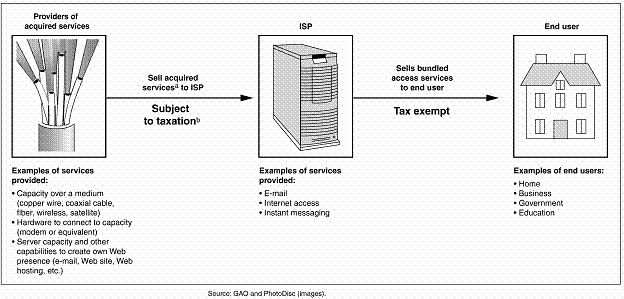"Since its 1998 origin, the moratorium has always prohibited taxing the service of providing Internet access, including component services that an access provider reasonably bundles in its access offering to consumers. However, as amended in 2004, the definition of Internet access contains additional words. With words added in 2004 in italics, it now defines the scope of nontaxable Internet access as
“a service that enables users to access content, information, electronic mail, or other services offered over the Internet, and may also include access to proprietary content, information, and other services as part of a package of services offered to users. The term ‘Internet access’ does not include telecommunications services, except to the extent such services are purchased, used, or sold by a provider of Internet access to provide Internet access.” (italics provided)
"As shown in the simplified illustration in figure 2, the items reasonably bundled in a tax-exempt Internet access package may include e-mail, instant messaging, and Internet access itself. Internet access, in turn, includes broadband services, such as cable modem and DSL services, which provide continuous, high-speed access without tying up wireline telephone service. As figure 2 also illustrates, a tax-exempt bundle does not include video, traditional wireline telephone service referred to as “plain old telephone service” (POTS), or VoIP. These services are subject to tax. For simplicity, the figure shows a number of services transmitted over one communications line. In reality, a line to a consumer may support just one service at a time, as is typically the case for POTS, or it may simultaneously support a variety of services, such as television, Internet access, and VoIP." [GAO 2007 p 8]
"Our reading of the 1998 law and the relevant legislative history indicates that Congress had intended to bar taxes on services bundled with access. However, there were different interpretations about whether DSL service could be taxed under existing law, and some states taxed DSL. The 2004 amendment was aimed at making sure that DSL service bundled with access could not be taxed." [GAO 2007 p 9]
Acquired Services
"Figure 3 shows how the nature and tax status of the Internet access services just described differ from the nature and tax status of services that an ISP acquires and uses to deliver access to its customers. An ISP in the middle of figure 3 acquires communications and other services and incidental supplies (shown on the left side of the figure) in order to deliver access services to customers (shown on the right side of the figure). We refer to the acquisitions on the left side as purchases of “acquired services.” For example, acquired services include ISP leases of high-speed communications capacity over wire, cable, or fiber to carry traffic from customers to the Internet backbone." [GAO 2007 p 10]

"Purchases of acquired services are subject to taxation, depending on state law, because the moratorium does not apply to acquired services. As noted above, the moratorium applies only to taxes imposed on “Internet access,” which is defined in the law as “a service that enables users to access content, information, electronic mail, or other services offered over the Internet.…” In other words, it is the service of providing Internet access to the end user—not the acquisition of capacity to do so—that constitutes “Internet access” subject to the moratorium.
"Some providers and state officials have construed the moratorium as barring taxation of acquired services, reading the 2004 amendments as making acquired services tax exempt. However, as indicated by the language of the statute, the 2004 amendments did not expand the definition of “Internet access,” but rather amended the exception from the definition to allow certain “telecommunication services” to qualify for the moratorium if they are part of the service of providing Internet access. A tax on acquired services is not a tax directly imposed on the service of providing Internet access.
"Our view that acquired services are not subject to the moratorium on taxing Internet access is based on the language and structure of the statute, as described further in the appendix. We acknowledge that others have different views about the scope of the moratorium. Congress could, of course, deal with this issue by amending the statute to explicitly address the tax status of acquired services." [GAO 2007 p 10]
2 comments:
Good article and comments. satellite internet access is the future of broadband internet technology.
Thanks for the nice post.
Post a Comment